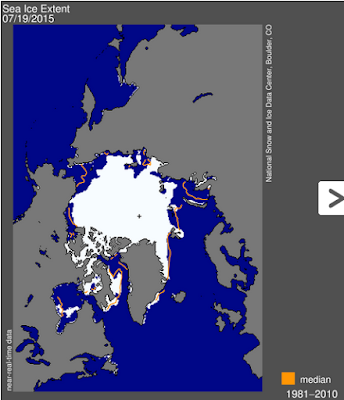According to the Open Mind blog
Maybe it's just me, but I have more trust in NASA, NOAA, the UK Met Office, and the Japan Meteorological Agency than I do in a source that is denying global warming based on estimating the lower troposphere temperature from satellite microwave sounder data, as the University of Alabama Huntsville team is doing. In fact, The Journal of Climate published a study that showed why the University of Alabama at Huntsville team was underestimating global warming. Additionally, Skeptical Science posted on why this was a flawed data source.
One of the reasons the UAH data is flawed is due to orbital decay in the paths of satellites. Hmmm, who do you think is better at adjusting satellite data for orbital decay -- a small group of researchers at UAH or the team at NASA? Also, it strains credibility to assume that satellite microwave sounder measurements of the troposphere are a better source of global surface temperature estimates than land and sea based temperature gauges.
Cruz also uses the other source satellite microwave sounder temperature reports, Remote Sensing Systems, to support his global warming denialism. However, Carl Mears the senior scientist at Remote Sensing Systems (RSS) "criticizes Cruz's approach and conclusions". Mears also indicates that it is likely that there are more errors in the RSS reports than in the temperature estimates from surface measurements.
In addition to Cruz cherry picking his data source, he also cherry picks his time frame. His "zero warming" claim is based on using an abnormally warm outlier year, 1998, as the starting point for his claim that there has been no warming in the past 17 years. There is significant variability in temperature from year to year, and it's hard to take seriously a trend analysis based on cherry picking an outlier year as the staring point. The upward trend in global surface temperatures is obvious to the naked eye if any of the other nine years in the 1990's is utilized as the starting point.
Ted Cruz's climate denailism sort of falls apart once you realize that it is based on his cherry picking a flawed source of temperature records. Legitimate analysis is not based on cherry picking data.
Additional Reading
There are 5 major sources of global temperature data which are most often referred to. Three of them are estimates of surface temperature, from NASA GISS (Goddard Institute for Space Studies), HadCRU (Hadley Centre/Climate Research Unit in the U.K.), and NCDC (National Climate Data Center). The other two are estimates of lower-troposphere temperature, from RSS (Remote Sensing Systems) and UAH (Univ. of Alabama at Huntsville).And there are numerous institutions that analyze the data and provide measurements of the global temperature using both satellite generated data and land/sea based temperature stations, as detailed in the Why So Many Global Temperature Records.
Maybe it's just me, but I have more trust in NASA, NOAA, the UK Met Office, and the Japan Meteorological Agency than I do in a source that is denying global warming based on estimating the lower troposphere temperature from satellite microwave sounder data, as the University of Alabama Huntsville team is doing. In fact, The Journal of Climate published a study that showed why the University of Alabama at Huntsville team was underestimating global warming. Additionally, Skeptical Science posted on why this was a flawed data source.
One of the reasons the UAH data is flawed is due to orbital decay in the paths of satellites. Hmmm, who do you think is better at adjusting satellite data for orbital decay -- a small group of researchers at UAH or the team at NASA? Also, it strains credibility to assume that satellite microwave sounder measurements of the troposphere are a better source of global surface temperature estimates than land and sea based temperature gauges.
Cruz also uses the other source satellite microwave sounder temperature reports, Remote Sensing Systems, to support his global warming denialism. However, Carl Mears the senior scientist at Remote Sensing Systems (RSS) "criticizes Cruz's approach and conclusions". Mears also indicates that it is likely that there are more errors in the RSS reports than in the temperature estimates from surface measurements.
In addition to Cruz cherry picking his data source, he also cherry picks his time frame. His "zero warming" claim is based on using an abnormally warm outlier year, 1998, as the starting point for his claim that there has been no warming in the past 17 years. There is significant variability in temperature from year to year, and it's hard to take seriously a trend analysis based on cherry picking an outlier year as the staring point. The upward trend in global surface temperatures is obvious to the naked eye if any of the other nine years in the 1990's is utilized as the starting point.
Ted Cruz's climate denailism sort of falls apart once you realize that it is based on his cherry picking a flawed source of temperature records. Legitimate analysis is not based on cherry picking data.
Additional Reading













